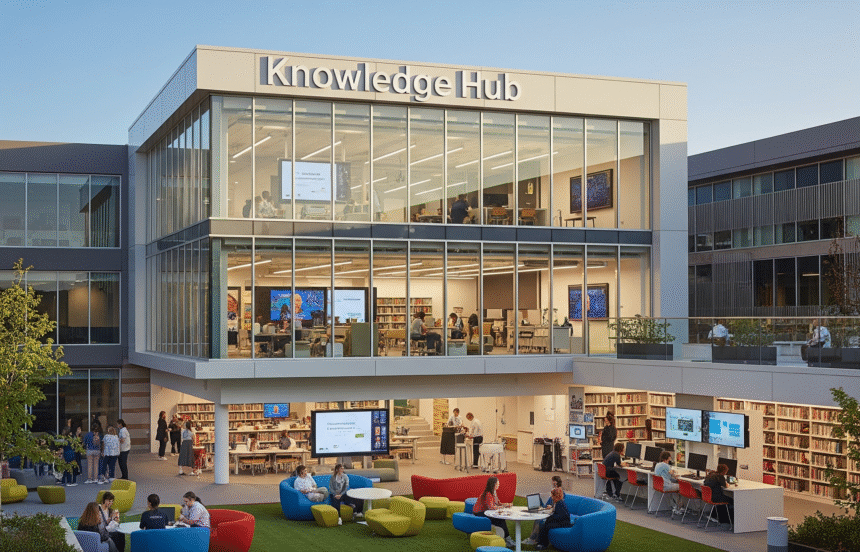Making Learning Cool: Why Schools Should Be More About Ideas and Less About Just Jobs
Mumbai, 2025 — Let’s face it, schools have always been seen as the ultimate factory for job-ready kids. But here’s the tea: life is more than just landing a 9-to-5. The world’s changing fast, and Gen Z is here for something bigger—creativity, innovation, and figuring out life on their own terms. That’s where the idea of schools as knowledge hubscomes in.
Forget the rat race for marks; it’s time schools started focusing on building skills, curiosity, and ideas that set students up for actual success. Let’s break down why this shift matters.
What’s a Knowledge Hub Anyway?
A knowledge hub is where schools stop being about just cramming for exams and instead become spaces where students explore, learn, and create. Think of it as your personal innovation station, where every class connects to real-world stuff, and the focus is on figuring things out, not just scoring big.
It’s about making education less about memorizing history dates and more about asking questions like, “Why did that even happen?” or “How can I use this to change the game today?”
Why This Gen Z Shift Is a Big Deal
The world isn’t waiting for you to fit into some mold. New industries, jobs, and ideas are popping up every day, and schools need to catch up. Here’s why knowledge hubs are the vibe for this generation:
1. Thinking > Memorizing
- In traditional schools, students are expected to absorb and spit out facts. But knowledge hubs focus on whysomething works and how you can use it to solve problems IRL.
- Schools like Sanskriti School in Delhi and Global Tech Academy are already switching to project-based learning. Imagine learning science by designing a solution for clean energy instead of just reading about it!
2. Learning for Life, Not Just a Job
- The skills you pick up in school—critical thinking, collaboration, creativity—are the same ones you’ll need whether you’re running a startup or writing the next big app.
- Plus, with automation taking over boring jobs, the real money’s in being able to think differently. Who needs a cookie-cutter career when you can be the one baking the whole cake?
How Knowledge Hubs Actually Work
1. Real-Life Vibes in Classrooms
No one’s saying we ditch textbooks completely, but pairing them with hands-on projects and tech? That’s how you make learning click. Schools like Bright Scholars Academy are using VR and AI to teach concepts—because dissecting a virtual frog is way cooler than the real thing.
2. Skills, Not Just Scores
Schools are embracing skills like coding, public speaking, design thinking, and even emotional intelligence. These are the things that make you stand out in a crowd of job applicants—or let’s be real, entrepreneurs.
3. Mentorship, Not Pressure
Instead of drowning in assignments, students in knowledge hubs get guidance from teachers-turned-mentors. They help students find their thing, whether that’s physics or graphic design.
Why This Matters for the Future
According to a LinkedIn Workforce Report, 85% of jobs in 2030 don’t even exist yet. Translation: traditional degrees won’t cut it anymore. The focus now is on learning how to learn. Schools that act as knowledge hubs build that growth mindset, giving students the confidence to adapt to literally anything life throws at them.
The Gen Z Edge
- You’re not here to do the same 9-to-5 grind your parents did. Whether it’s launching your own brand, creating a killer app, or solving climate change, you need skills that go beyond a classroom.
- Schools that prioritize knowledge hubs are teaching these skills NOW, so you’re ready to crush it later.
So, What Needs to Change?
If schools want to stay relevant for Gen Z, they need to:
- Ditch the Old-School Rules: No more rote memorization; let’s get creative.
- Bring in the Tech: AI, VR, and gamified learning make education fun and future-proof.
- Focus on Exploration: Schools should give students the freedom to find their passions, not box them into fixed careers.
- Get Real About Careers: Show students there’s more than one path to success—be it freelancing, entrepreneurship, or changing the world.
Conclusion
Gen Z isn’t here to play by the old rules, and neither should schools. Turning schools into knowledge hubs is the key to making education about more than just a career. It’s about unlocking creativity, asking big questions, and building the skills to tackle whatever the future holds.
So, next time someone asks, “Why do we even need school?” remind them: It’s not about the job; it’s about who you’re becoming along the way. And that’s a vibe worth investing in.


Leave a Reply